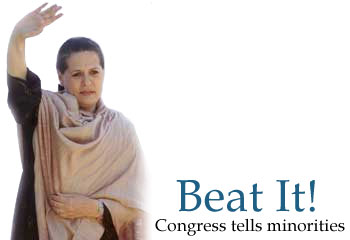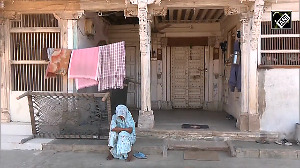
He is big enough to have them for breakfast, they worry, and growing bigger every day. What can they do to stop him?
The Congress Working Committee discussed that in New Delhi recently. But even after an eight-hour meeting, it couldn't figure out just how to shackle Gujarat Chief Minister Narendra Modi.
Modi is acquiring an irrationally huge image after his win in Gujarat, a CWC member said. Proof: the CM's January 12 rally in Mumbai, possibly his largest in recent times.
"We are divided," the Congress leader said, "and our cadre is petrified of him."
Naturally, the CWC meeting focused on Modi and Modi-related issues -- like the growing appeal of Hindutva and the soft Hindutva approach the Congress used in the Gujarat election.
Congress general secretary Kamal Nath, who headed its poll strategy in Gujarat, came in for sharp criticism from Arjun Singh, his arch rival.
The veteran blamed the debacle on the soft Hindutva approach Kamal Nath charted out, which, Singh said, saw the party avoiding all ties with Muslim leaders, at most places even refusing to seat them on the dais.
Gandhi, for her part, was more interested in a remedy than such finger-pointing. The outcome? "We have decided not to change our strategy," said the member.
He said that since secularism as a concept has "no appeal among a new generation of Indian voters", the Congress is unlikely to claim it as the main plank in the coming elections.
Arjun Singh, for his part, said the party should fight Modi's brand of Hindutva, which the Bharatiya Janata Party now plans to adopt in all states, head-on, sticking to its principle of secularism.
But younger leaders like Kamal Nath, Ahmed Patel and Kerala Chief Minister A K Antony countered him.
Madhya Pradesh Chief Minister Digvijay Singh and his Rajasthan counterpart Ashok Gehlot, too, said the Congress should avoid "Hindu-bashing" at all costs.
Apparently in tune with this, both CMs now visit temples and patronize Hindu gurus openly, to convey to the community that its sentiments are no less important to them.
'Pampering the minority will not work,' Antony, himself from a minority community, reportedly said. 'The party must worry about the majority's votes.'
In preparation for the impending assembly polls, Gandhi has also begun taking a more active role in the states where the Congress rules. Incompetence and bad governance, she conveyed to her chief ministers, will not be tolerated. She has already replaced Vilas Deshmukh in Maharashtra with Sushilkumar Shinde.
Before the Godhra carnage, the Congress had high hopes of Gandhi emerging the prime minister in the 2004 Lok Sabha election. But that appears difficult now, thanks mostly to Modi's success.
"We are looking for new ideas," the CWC member said, "but unfortunately Congress leaders lack commitment to the ideas they propagate."
The Congress assessment is that it will put up neck-and-neck fights against the BJP in Madhya Pradesh, Rajasthan, Karnataka, Kerala, Andhra Pradesh and Orissa. But in most other larger states, it has not improved "an inch" since the 1999 general election.
Another worrying factor is that the 14 states it is in power (as compared to the BJP's two -- Gujarat and Himachal Pradesh) together constitute only 27 per cent of the seats in the Lok Sabha.
"The Congress can come back if it learns the art of mass agitation," said former prime minister V P Singh. "Come out on the streets. The BJP is most vulnerable on economic issues. Hit them where it hurts most. Fight on the issues of electricity, water and drugs. They can't put up a VHP brigade to answer these issues."
But that alone will not help, said Harish Khare, political editor of The Hindu. "The Congress needs a message and a messenger with credibility to go to the masses. Till that time comes, nothing will work -- neither hard Hindutva nor soft."






 © 2025
© 2025